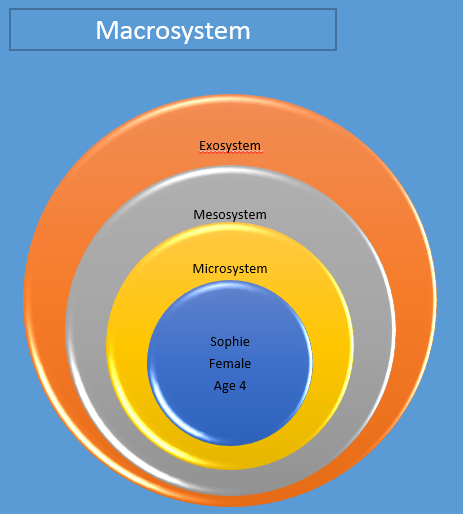Ecological Systems Theory
Edited by Afitzgerald, Jen Moreau, SarMal, Sharingknowledge
Child development can be divided into different areas or domains including: physical, moral, social, cognitive and mental. This development is shaped by many different influences. According to Urie Bronfenbrenner, the environment in which a child grows up will shape and affect his or her development. He calls this environment the Ecological System[1]. The Ecological System includes the physical, social, cultural, financial and religious environment in which the child matures and grows into an adult. Bronfenbrenner recommends investigating the Ecological System of the child, in order to understand and explain that child's development.
Bronfenbrenner developed this theory in the late Sixties. At this time, most psychology research took place in laboratories, and entailed experimental studies. Bronfenbrenner was very critical of this approach. He did not think that people could act and behave in a healthy and natural manner in a lab when they knew they were being watched and observed. Consequently, he believed that the findings from these experimental studies were not accurate or valid, and did not give any valuable information.
When Bronfenbrenner began to build his Ecological Systems Theory, his approach reflected Outlook. His research did not involve any laboratory-based experiments. He took a different approach and based his theory on observation, studying the behavior and actions of children as they went about their daily lives, in school, at home, taking part in groups and clubs and only playing together.
Environmental Effect on Development
Urie Bronfenbrenner explained the impact of proximal processes. Proximal Processes are interactions between the child and his surroundings. Examples his activities and exchanges with parents, teachers, coaches and friends at school, during play, and at home. Bronfenbrenner divides the environment into 4 different levels.
- 1Microsystem.Advertisement
- 2Mesosystem.
- 3Exosystem.
- 4Macrosystem.
We will now more closely examine these levels, looking at how they impact on the development of 4-year-old Sophie. Have a look at the diagram below. See how the microsystem is nearest to Sophie, which demonstrates the microsystem as the closest system to Sophie and the one which she has the most direct connection.
Microsystem
The microsystem is the system which the child has the most direct contact with. It describes how the child spends its life. In Sophie's case, it includes her family, kindergarten, neighborhood playgroup and babysitter. According to Bronfenbrenner, Sophie's development may be shaped by the activities and happenings at Kindergarten. For example, fingerpainting, threading beads and practicing pencil grip will help Sophie's physical development. If Sophie's mom reads to her every night, her language development and vocabulary growth will increase. On a more negative note, Sophie's social development and self-esteem may be affected if playgroup staff fails to realize that Sophie is the target of bullying behaviors from a group of other kids.
Mesosystem
The mesosystem outlines the exchanges between the various components of the microsystem e.g. the relationship between home and school and the relationship between home and friends. Sophie's parents may help her cognitive development by helping her with homework, speaking with her teacher regularly to quickly identify any problems she may be having and to find out ways of helping her learn at home. Arranging playdates will help Sophie's social development.
Exosystem
When we talk about the exosystem, we talk about connections between a child and a setting which affects them, but one of which they do not have any contact, such as a parent's workplace or school management. Think back to Sophie. If school management decides to spend their budget on a new mindfulness curriculum and training, Sophie's psychological development will benefit. Conversely, if her dad loses his job, there will be less money for food and her physical development will be affected.
Macrosystem
The macrosystem is the background of all the other parts of the Ecological System, and it means the culture in which the child spends their life. Many cultural factors affect development. They include: poverty, cultural values, wealth of the country, role of women in society, role of religion in society. If Sophie lives in a country that does not value education for girls/ a society where women's roles are confined to the home, Sophie may not get to attend school. She may not learn to read, to count, or to problem solve. Her cognitive development will be affected. She may not get the opportunity to play with children her own age and social development may be negatively affected and delayed. If Sophie lives in a religious society, her development of a moral code may be strongly based on her by religious beliefs.
Conclusion
This theory has influenced the way psychologists practice and work because it is now recognized that the environment does impact, influence and shape development. This has strongly influenced the way psychologists work with children. Since Bronfenbrenner's work; psychologists now collaborate with children's families, teachers, caregivers and community groups. This acknowledges the affect and influence other children and the environment affects a child's development.
Referencing this Article
If you need to reference this article in your work, you can copy-paste the following depending on your required format:
APA (American Psychological Association)
Ecological Systems Theory. (2017). In ScienceAid. Retrieved Apr 19, 2024, from https://scienceaid.net/Ecological_Systems_Theory
MLA (Modern Language Association) "Ecological Systems Theory." ScienceAid, scienceaid.net/Ecological_Systems_Theory Accessed 19 Apr 2024.
Chicago / Turabian ScienceAid.net. "Ecological Systems Theory." Accessed Apr 19, 2024. https://scienceaid.net/Ecological_Systems_Theory.
If you have problems with any of the steps in this article, please ask a question for more help, or post in the comments section below.
Comments
Article Info
Categories : Psychology
Recent edits by: SarMal, Jen Moreau, Afitzgerald











